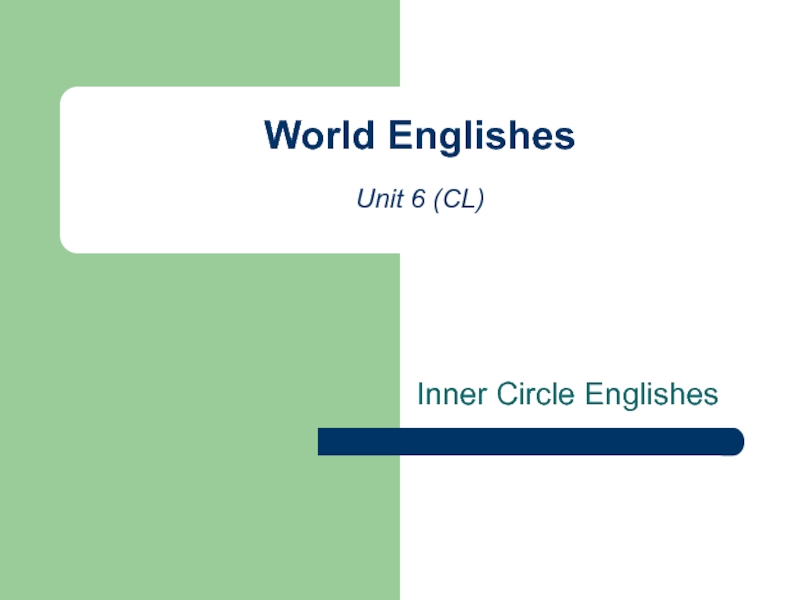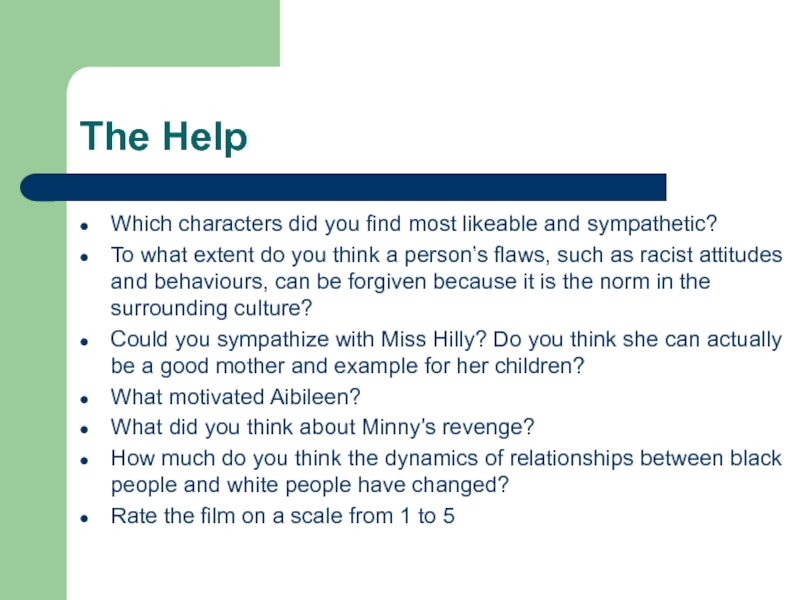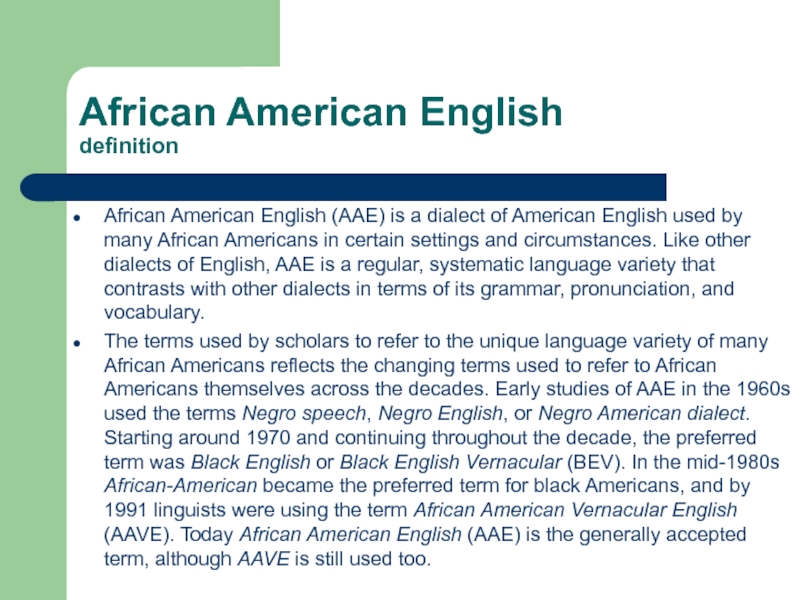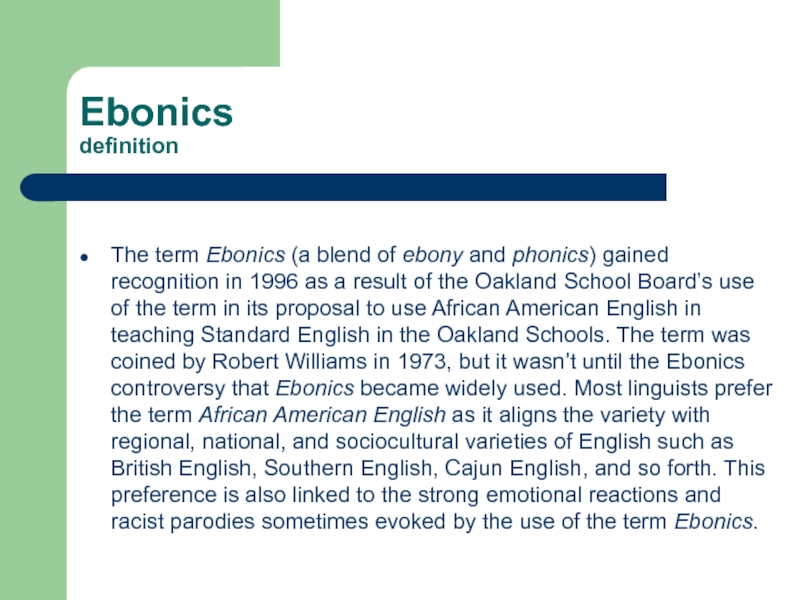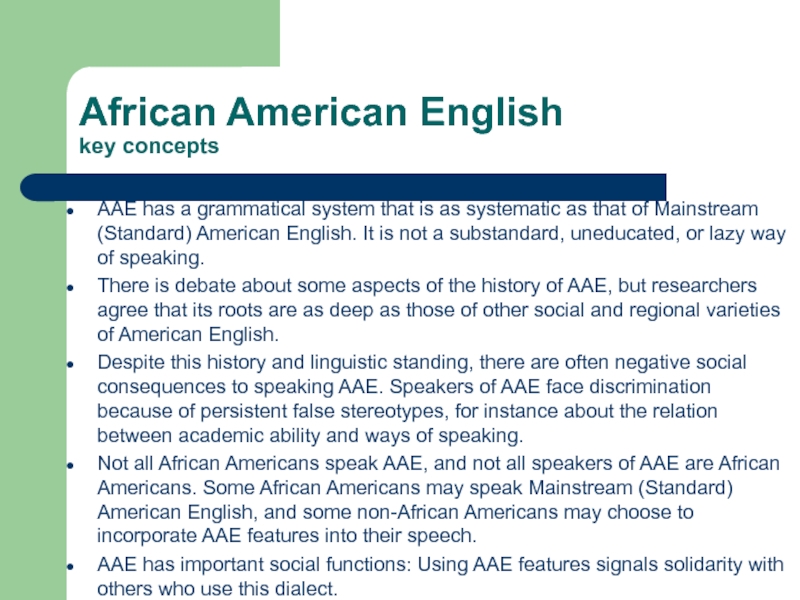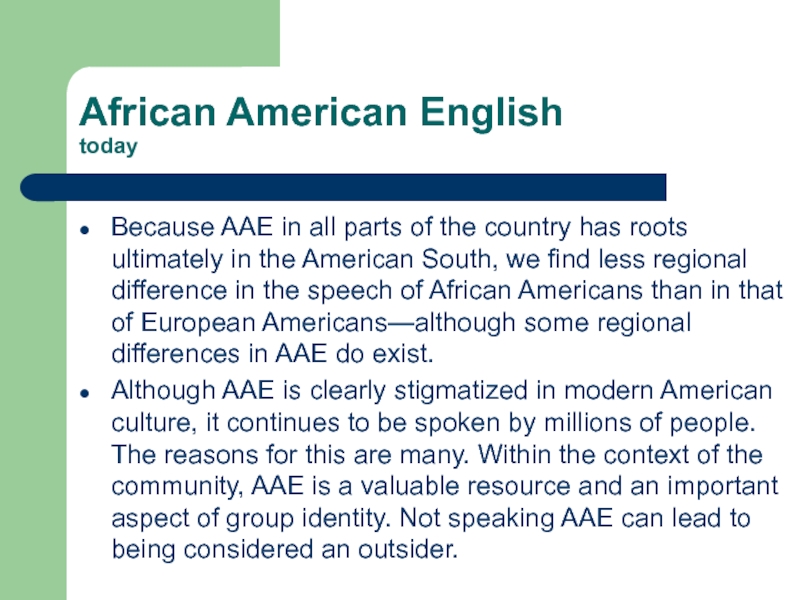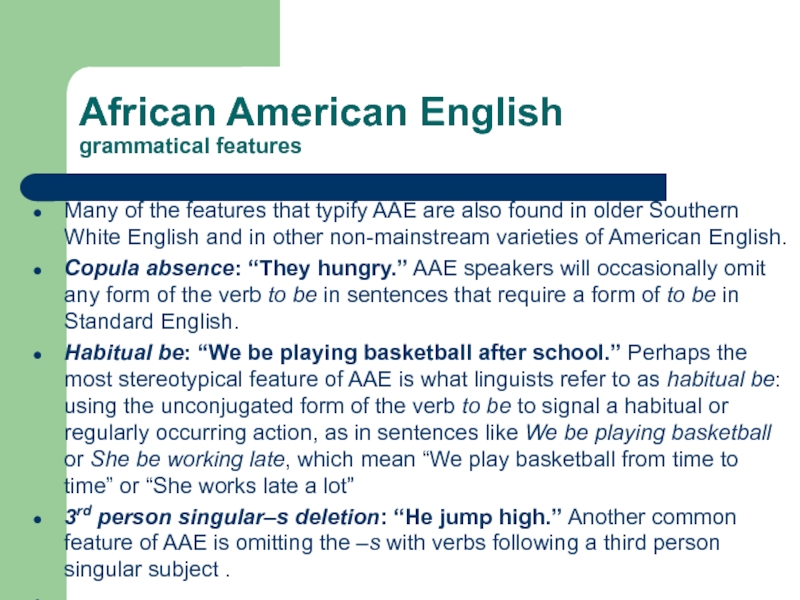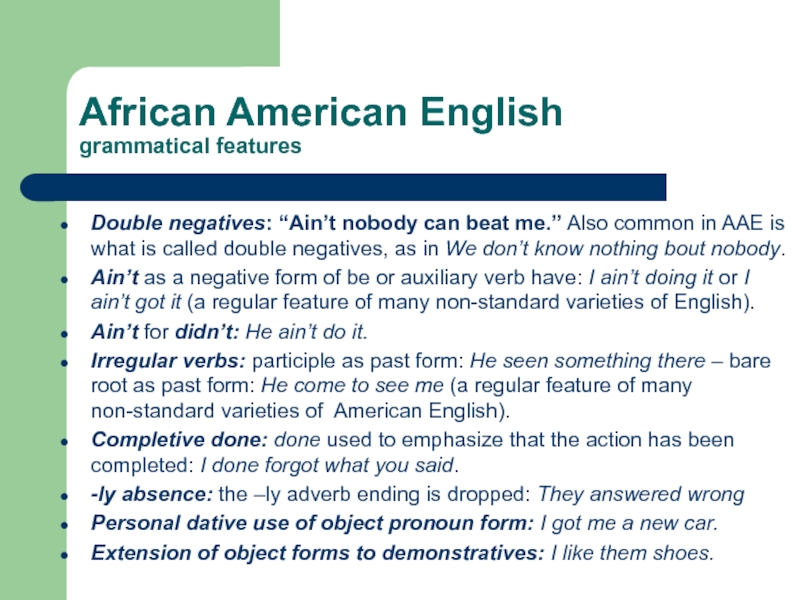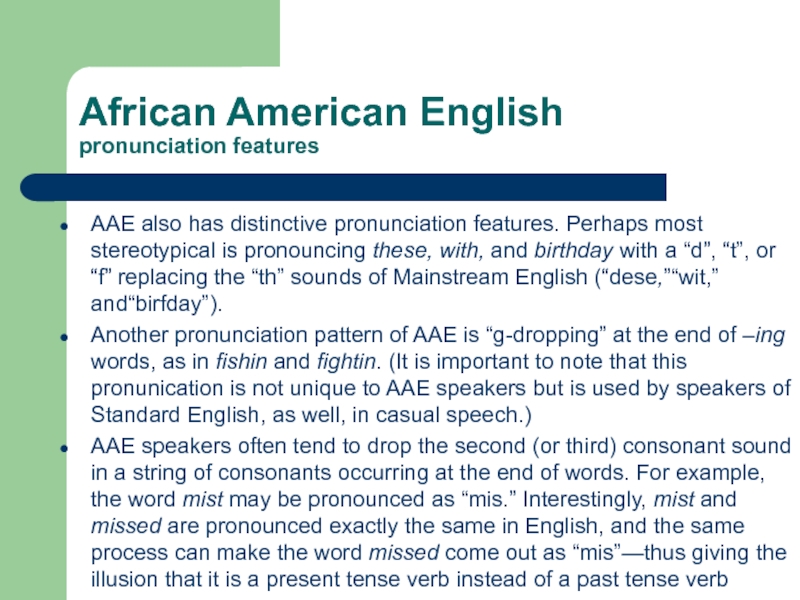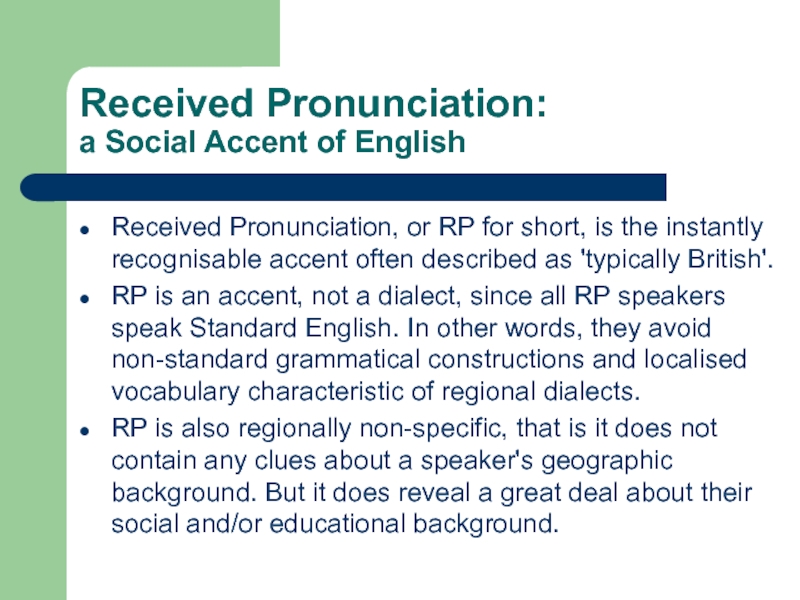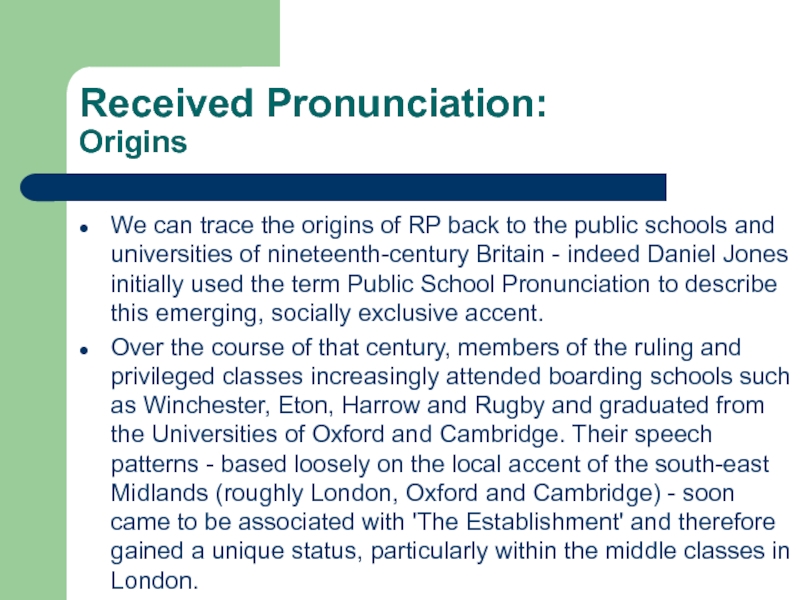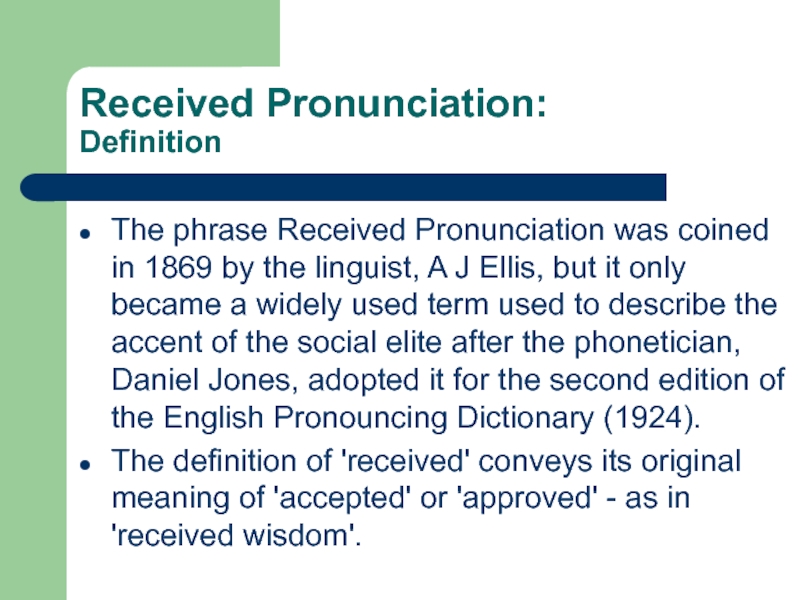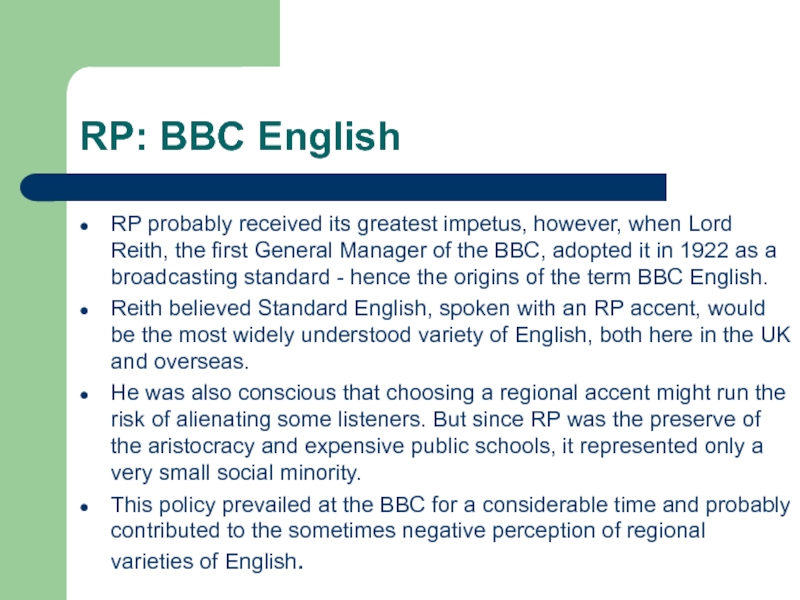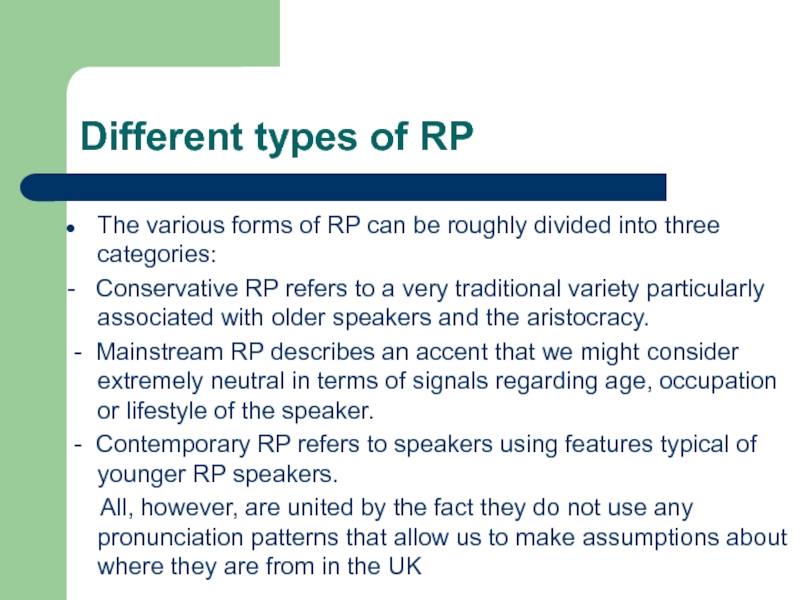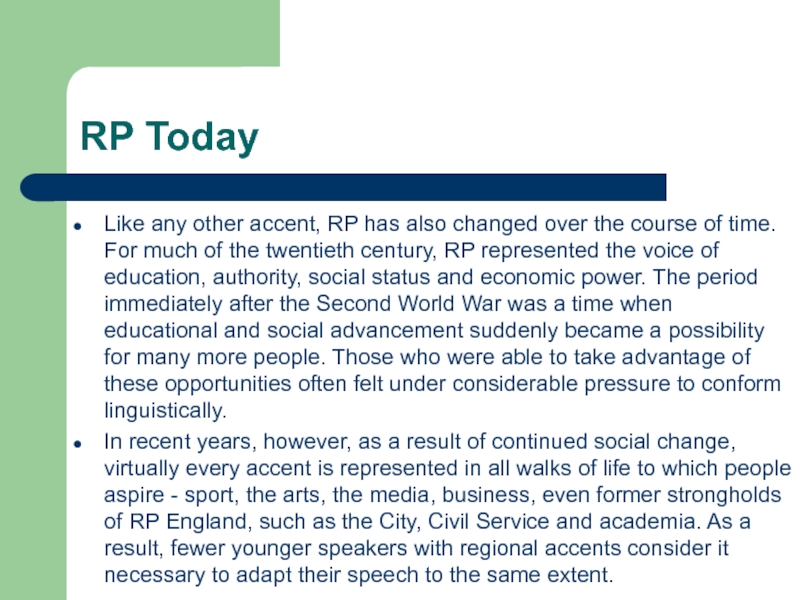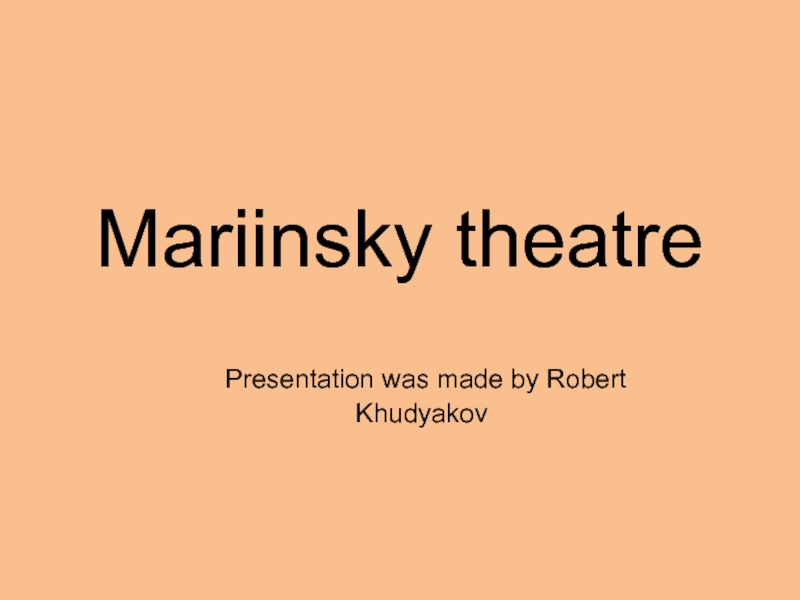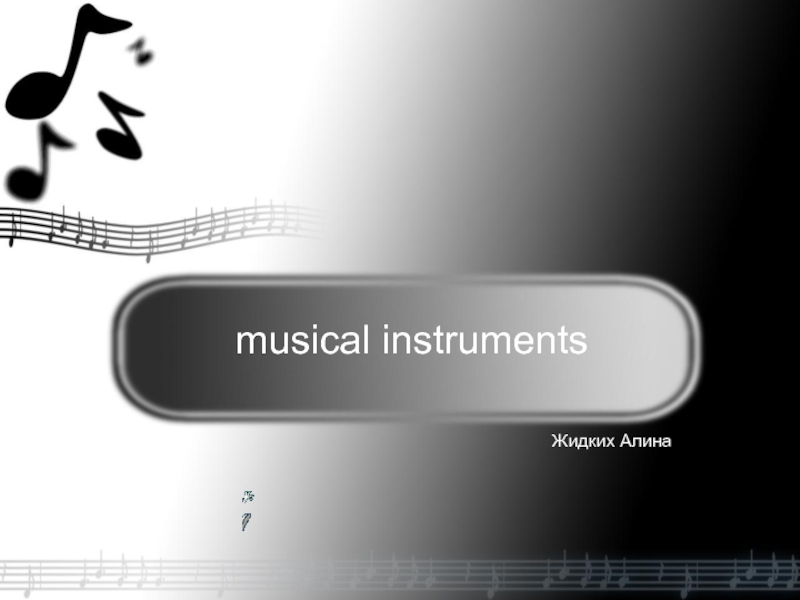- Главная
- Разное
- Дизайн
- Бизнес и предпринимательство
- Аналитика
- Образование
- Развлечения
- Красота и здоровье
- Финансы
- Государство
- Путешествия
- Спорт
- Недвижимость
- Армия
- Графика
- Культурология
- Еда и кулинария
- Лингвистика
- Английский язык
- Астрономия
- Алгебра
- Биология
- География
- Детские презентации
- Информатика
- История
- Литература
- Маркетинг
- Математика
- Медицина
- Менеджмент
- Музыка
- МХК
- Немецкий язык
- ОБЖ
- Обществознание
- Окружающий мир
- Педагогика
- Русский язык
- Технология
- Физика
- Философия
- Химия
- Шаблоны, картинки для презентаций
- Экология
- Экономика
- Юриспруденция
African American English definition презентация
Содержание
- 1. African American English definition
- 2. The Help Which
- 3. African American English definition African American English
- 4. Ebonics definition The term Ebonics (a
- 5. African American English key concepts AAE has
- 6. African American English origins Even after decades
- 7. African American English today Because AAE in
- 8. African American English grammatical features Many of
- 9. African American English grammatical features Double negatives:
- 10. African American English pronunciation features AAE also
- 11. Received Pronunciation: a Social Accent of English
- 12. Received Pronunciation: Origins We can trace the
- 13. Received Pronunciation: Definition The phrase Received Pronunciation
- 14. RP: BBC English RP probably received its
- 15. Different types of RP The various forms
- 16. RP Today Like any other accent, RP
Слайд 2
The Help
Which characters did you find most likeable and sympathetic?
To what
extent do you think a person’s flaws, such as racist attitudes and behaviours, can be forgiven because it is the norm in the surrounding culture?
Could you sympathize with Miss Hilly? Do you think she can actually be a good mother and example for her children?
What motivated Aibileen?
What did you think about Minny’s revenge?
How much do you think the dynamics of relationships between black people and white people have changed?
Rate the film on a scale from 1 to 5
Could you sympathize with Miss Hilly? Do you think she can actually be a good mother and example for her children?
What motivated Aibileen?
What did you think about Minny’s revenge?
How much do you think the dynamics of relationships between black people and white people have changed?
Rate the film on a scale from 1 to 5
Слайд 3African American English
definition
African American English (AAE) is a dialect of American
English used by many African Americans in certain settings and circumstances. Like other dialects of English, AAE is a regular, systematic language variety that contrasts with other dialects in terms of its grammar, pronunciation, and vocabulary.
The terms used by scholars to refer to the unique language variety of many African Americans reflects the changing terms used to refer to African Americans themselves across the decades. Early studies of AAE in the 1960s used the terms Negro speech, Negro English, or Negro American dialect. Starting around 1970 and continuing throughout the decade, the preferred term was Black English or Black English Vernacular (BEV). In the mid-1980s African-American became the preferred term for black Americans, and by 1991 linguists were using the term African American Vernacular English (AAVE). Today African American English (AAE) is the generally accepted term, although AAVE is still used too.
The terms used by scholars to refer to the unique language variety of many African Americans reflects the changing terms used to refer to African Americans themselves across the decades. Early studies of AAE in the 1960s used the terms Negro speech, Negro English, or Negro American dialect. Starting around 1970 and continuing throughout the decade, the preferred term was Black English or Black English Vernacular (BEV). In the mid-1980s African-American became the preferred term for black Americans, and by 1991 linguists were using the term African American Vernacular English (AAVE). Today African American English (AAE) is the generally accepted term, although AAVE is still used too.
Слайд 4Ebonics
definition
The term Ebonics (a blend of ebony and phonics) gained recognition
in 1996 as a result of the Oakland School Board’s use of the term in its proposal to use African American English in teaching Standard English in the Oakland Schools. The term was coined by Robert Williams in 1973, but it wasn’t until the Ebonics controversy that Ebonics became widely used. Most linguists prefer the term African American English as it aligns the variety with regional, national, and sociocultural varieties of English such as British English, Southern English, Cajun English, and so forth. This preference is also linked to the strong emotional reactions and racist parodies sometimes evoked by the use of the term Ebonics.
Слайд 5African American English
key concepts
AAE has a grammatical system that is as
systematic as that of Mainstream (Standard) American English. It is not a substandard, uneducated, or lazy way of speaking.
There is debate about some aspects of the history of AAE, but researchers agree that its roots are as deep as those of other social and regional varieties of American English.
Despite this history and linguistic standing, there are often negative social consequences to speaking AAE. Speakers of AAE face discrimination because of persistent false stereotypes, for instance about the relation between academic ability and ways of speaking.
Not all African Americans speak AAE, and not all speakers of AAE are African Americans. Some African Americans may speak Mainstream (Standard) American English, and some non-African Americans may choose to incorporate AAE features into their speech.
AAE has important social functions: Using AAE features signals solidarity with others who use this dialect.
There is debate about some aspects of the history of AAE, but researchers agree that its roots are as deep as those of other social and regional varieties of American English.
Despite this history and linguistic standing, there are often negative social consequences to speaking AAE. Speakers of AAE face discrimination because of persistent false stereotypes, for instance about the relation between academic ability and ways of speaking.
Not all African Americans speak AAE, and not all speakers of AAE are African Americans. Some African Americans may speak Mainstream (Standard) American English, and some non-African Americans may choose to incorporate AAE features into their speech.
AAE has important social functions: Using AAE features signals solidarity with others who use this dialect.
Слайд 6African American English
origins
Even after decades of research on African American English
(AAE), there is still no consensus as to exactly how it has developed.
One theory suggests that when slaves of different language backgrounds were transported from Africa to America, they developed a pidgin. This language subsequently developed into a full-fledged creole language that children acquired in their homes.
A second theory is that slaves in the South worked alongside indentured servants who spoke non-mainstream varieties of English. African American slaves learned English from these indentured servants (often of Scots-Irish descent).
It is important to note that these theories are not mutually exclusive. The true history of AAE may lie somewhere in between or in both of these theories.
One theory suggests that when slaves of different language backgrounds were transported from Africa to America, they developed a pidgin. This language subsequently developed into a full-fledged creole language that children acquired in their homes.
A second theory is that slaves in the South worked alongside indentured servants who spoke non-mainstream varieties of English. African American slaves learned English from these indentured servants (often of Scots-Irish descent).
It is important to note that these theories are not mutually exclusive. The true history of AAE may lie somewhere in between or in both of these theories.
Слайд 7African American English
today
Because AAE in all parts of the country has
roots ultimately in the American South, we find less regional difference in the speech of African Americans than in that of European Americans—although some regional differences in AAE do exist.
Although AAE is clearly stigmatized in modern American culture, it continues to be spoken by millions of people. The reasons for this are many. Within the context of the community, AAE is a valuable resource and an important aspect of group identity. Not speaking AAE can lead to being considered an outsider.
Although AAE is clearly stigmatized in modern American culture, it continues to be spoken by millions of people. The reasons for this are many. Within the context of the community, AAE is a valuable resource and an important aspect of group identity. Not speaking AAE can lead to being considered an outsider.
Слайд 8African American English
grammatical features
Many of the features that typify AAE are
also found in older Southern White English and in other non-mainstream varieties of American English.
Copula absence: “They hungry.” AAE speakers will occasionally omit any form of the verb to be in sentences that require a form of to be in Standard English.
Habitual be: “We be playing basketball after school.” Perhaps the most stereotypical feature of AAE is what linguists refer to as habitual be: using the unconjugated form of the verb to be to signal a habitual or regularly occurring action, as in sentences like We be playing basketball or She be working late, which mean “We play basketball from time to time” or “She works late a lot”
3rd person singular–s deletion: “He jump high.” Another common feature of AAE is omitting the –s with verbs following a third person singular subject .
Copula absence: “They hungry.” AAE speakers will occasionally omit any form of the verb to be in sentences that require a form of to be in Standard English.
Habitual be: “We be playing basketball after school.” Perhaps the most stereotypical feature of AAE is what linguists refer to as habitual be: using the unconjugated form of the verb to be to signal a habitual or regularly occurring action, as in sentences like We be playing basketball or She be working late, which mean “We play basketball from time to time” or “She works late a lot”
3rd person singular–s deletion: “He jump high.” Another common feature of AAE is omitting the –s with verbs following a third person singular subject .
Слайд 9African American English
grammatical features
Double negatives: “Ain’t nobody can beat me.” Also
common in AAE is what is called double negatives, as in We don’t know nothing bout nobody.
Ain’t as a negative form of be or auxiliary verb have: I ain’t doing it or I ain’t got it (a regular feature of many non-standard varieties of English).
Ain’t for didn’t: He ain’t do it.
Irregular verbs: participle as past form: He seen something there – bare root as past form: He come to see me (a regular feature of many non-standard varieties of American English).
Completive done: done used to emphasize that the action has been completed: I done forgot what you said.
-ly absence: the –ly adverb ending is dropped: They answered wrong
Personal dative use of object pronoun form: I got me a new car.
Extension of object forms to demonstratives: I like them shoes.
Ain’t as a negative form of be or auxiliary verb have: I ain’t doing it or I ain’t got it (a regular feature of many non-standard varieties of English).
Ain’t for didn’t: He ain’t do it.
Irregular verbs: participle as past form: He seen something there – bare root as past form: He come to see me (a regular feature of many non-standard varieties of American English).
Completive done: done used to emphasize that the action has been completed: I done forgot what you said.
-ly absence: the –ly adverb ending is dropped: They answered wrong
Personal dative use of object pronoun form: I got me a new car.
Extension of object forms to demonstratives: I like them shoes.
Слайд 10African American English
pronunciation features
AAE also has distinctive pronunciation features. Perhaps most
stereotypical is pronouncing these, with, and birthday with a “d”, “t”, or “f” replacing the “th” sounds of Mainstream English (“dese,”“wit,” and“birfday”).
Another pronunciation pattern of AAE is “g-dropping” at the end of –ing words, as in fishin and fightin. (It is important to note that this pronunication is not unique to AAE speakers but is used by speakers of Standard English, as well, in casual speech.)
AAE speakers often tend to drop the second (or third) consonant sound in a string of consonants occurring at the end of words. For example, the word mist may be pronounced as “mis.” Interestingly, mist and missed are pronounced exactly the same in English, and the same process can make the word missed come out as “mis”—thus giving the illusion that it is a present tense verb instead of a past tense verb
Another pronunciation pattern of AAE is “g-dropping” at the end of –ing words, as in fishin and fightin. (It is important to note that this pronunication is not unique to AAE speakers but is used by speakers of Standard English, as well, in casual speech.)
AAE speakers often tend to drop the second (or third) consonant sound in a string of consonants occurring at the end of words. For example, the word mist may be pronounced as “mis.” Interestingly, mist and missed are pronounced exactly the same in English, and the same process can make the word missed come out as “mis”—thus giving the illusion that it is a present tense verb instead of a past tense verb
Слайд 11Received Pronunciation:
a Social Accent of English
Received Pronunciation, or RP for short,
is the instantly recognisable accent often described as 'typically British'.
RP is an accent, not a dialect, since all RP speakers speak Standard English. In other words, they avoid non-standard grammatical constructions and localised vocabulary characteristic of regional dialects.
RP is also regionally non-specific, that is it does not contain any clues about a speaker's geographic background. But it does reveal a great deal about their social and/or educational background.
RP is an accent, not a dialect, since all RP speakers speak Standard English. In other words, they avoid non-standard grammatical constructions and localised vocabulary characteristic of regional dialects.
RP is also regionally non-specific, that is it does not contain any clues about a speaker's geographic background. But it does reveal a great deal about their social and/or educational background.
Слайд 12Received Pronunciation:
Origins
We can trace the origins of RP back to the
public schools and universities of nineteenth-century Britain - indeed Daniel Jones initially used the term Public School Pronunciation to describe this emerging, socially exclusive accent.
Over the course of that century, members of the ruling and privileged classes increasingly attended boarding schools such as Winchester, Eton, Harrow and Rugby and graduated from the Universities of Oxford and Cambridge. Their speech patterns - based loosely on the local accent of the south-east Midlands (roughly London, Oxford and Cambridge) - soon came to be associated with 'The Establishment' and therefore gained a unique status, particularly within the middle classes in London.
Over the course of that century, members of the ruling and privileged classes increasingly attended boarding schools such as Winchester, Eton, Harrow and Rugby and graduated from the Universities of Oxford and Cambridge. Their speech patterns - based loosely on the local accent of the south-east Midlands (roughly London, Oxford and Cambridge) - soon came to be associated with 'The Establishment' and therefore gained a unique status, particularly within the middle classes in London.
Слайд 13Received Pronunciation:
Definition
The phrase Received Pronunciation was coined in 1869 by the
linguist, A J Ellis, but it only became a widely used term used to describe the accent of the social elite after the phonetician, Daniel Jones, adopted it for the second edition of the English Pronouncing Dictionary (1924).
The definition of 'received' conveys its original meaning of 'accepted' or 'approved' - as in 'received wisdom'.
The definition of 'received' conveys its original meaning of 'accepted' or 'approved' - as in 'received wisdom'.
Слайд 14RP: BBC English
RP probably received its greatest impetus, however, when Lord
Reith, the first General Manager of the BBC, adopted it in 1922 as a broadcasting standard - hence the origins of the term BBC English.
Reith believed Standard English, spoken with an RP accent, would be the most widely understood variety of English, both here in the UK and overseas.
He was also conscious that choosing a regional accent might run the risk of alienating some listeners. But since RP was the preserve of the aristocracy and expensive public schools, it represented only a very small social minority.
This policy prevailed at the BBC for a considerable time and probably contributed to the sometimes negative perception of regional varieties of English.
Reith believed Standard English, spoken with an RP accent, would be the most widely understood variety of English, both here in the UK and overseas.
He was also conscious that choosing a regional accent might run the risk of alienating some listeners. But since RP was the preserve of the aristocracy and expensive public schools, it represented only a very small social minority.
This policy prevailed at the BBC for a considerable time and probably contributed to the sometimes negative perception of regional varieties of English.
Слайд 15Different types of RP
The various forms of RP can be roughly
divided into three categories:
- Conservative RP refers to a very traditional variety particularly associated with older speakers and the aristocracy.
- Mainstream RP describes an accent that we might consider extremely neutral in terms of signals regarding age, occupation or lifestyle of the speaker.
- Contemporary RP refers to speakers using features typical of younger RP speakers.
All, however, are united by the fact they do not use any pronunciation patterns that allow us to make assumptions about where they are from in the UK
- Conservative RP refers to a very traditional variety particularly associated with older speakers and the aristocracy.
- Mainstream RP describes an accent that we might consider extremely neutral in terms of signals regarding age, occupation or lifestyle of the speaker.
- Contemporary RP refers to speakers using features typical of younger RP speakers.
All, however, are united by the fact they do not use any pronunciation patterns that allow us to make assumptions about where they are from in the UK
Слайд 16RP Today
Like any other accent, RP has also changed over the
course of time. For much of the twentieth century, RP represented the voice of education, authority, social status and economic power. The period immediately after the Second World War was a time when educational and social advancement suddenly became a possibility for many more people. Those who were able to take advantage of these opportunities often felt under considerable pressure to conform linguistically.
In recent years, however, as a result of continued social change, virtually every accent is represented in all walks of life to which people aspire - sport, the arts, the media, business, even former strongholds of RP England, such as the City, Civil Service and academia. As a result, fewer younger speakers with regional accents consider it necessary to adapt their speech to the same extent.
In recent years, however, as a result of continued social change, virtually every accent is represented in all walks of life to which people aspire - sport, the arts, the media, business, even former strongholds of RP England, such as the City, Civil Service and academia. As a result, fewer younger speakers with regional accents consider it necessary to adapt their speech to the same extent.
